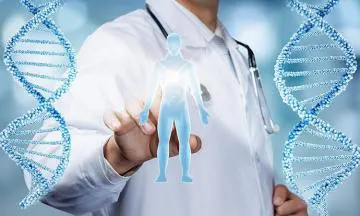

Everything You Need to Know About Treating Hormonal Acne
When you hear the word "hormonal acne," you probably think of the deep, super-red, painful pimples that haunted you as a teenager. However, for many others, such outbreaks are more than just a distant memory. Unfortunately, hormonal acne can appear much later in life (and just in time to crash that party you were invited to).
According to a study by the American Academy of Dermatology (AAD), Acne caused by hormones can strike at any age. Acne affects approximately 50% of women in their 20s, 35% of women in their 30s, and 26% of women in their 40s. Continue reading to find out what hormonal acne looks like, what causes it, and how to treat it.
What Does Hormonal Acne Look Like?
Hormonal acne is generally cystic and inflammatory. It causes painful red papules, pustules, and deep cysts on the lower face, and it can cause long-term scarring (especially if you attempt to pop it). In its mildest form, hormonal acne appears as a breakout or two during menstruation, but for many, it can last all month.
Hormonal acne causes?
Hormonal variations in a woman's body begin at puberty and continue until menopause. Anxiety, diet, menstruation, polycystic ovarian syndrome (PCOS), menopause, elevated androgen levels, pregnancy, and oral contraceptives are all variables that contribute to a hormonal imbalance in women and, as a result, acne production.
What factors can aggravate hormonal acne?
- Stress.
- Pollution.
- Humidity.
- Squeezing them
- Poor Diet

What effect does hormonal acne have on my skin?
Breakouts are caused by hormonal acne. These appear as bumps on your skin and, if left untreated, can become red, inflammatory, painful, and sore. Untreated moderate to severe acne can result in scarring.
Hormonal Acne Signs:
- Pimples appear around the T-zone, chin, and jawline.
- You are suffering from painful cysts.
- Breakouts happen once a month.
- Suffering from acne even after puberty
What is the difference between fungal acne and hormonal acne?
Because both types of acne begin in the hair follicles, fungal acne and hormonal acne are commonly mistaken. Fungal acne arises when there is an overabundance of yeast, whereas hormonal acne is caused by an excess of sebum. Fungal acne can cause whiteheads, itching, and skin that is red, irritated, and inflamed.
What can you do to treat hormonal acne?
It is essential to build an optimal skincare routine to clean up hormonal acne and keep it at bay.
- You should wash your face twice a day, once in the morning and once in the evening.
- Use no more than a pea-sized dose of any acne treatment. An excessive application might dry out your skin and aggravate it.
- Apply sunscreen every day.
- To lessen the likelihood of blocked pores, use only non-comedogenic products.
Also Read: Hormonal acne: what causes it and how to treat it
Also Read: Easy Remedies For Acne That Really Work
Conventional Treatment
Antibiotics, cosmetic remedies, and birth control pills are examples of conventional treatment methods. These may only provide temporary relief, and the acne will generally return as soon as you stop using them. It can also cause skin redness, discoloration, dryness, and other negative effects.
Homeopathy hormonal acne treatment
Homeopathic treatment is both effective and non-toxic. In comparison to conventional acne treatments and medications, which have potentially severe side effects. Homeopathy does not mask the symptoms of acne on the surface; rather, it targets the underlying cause or root of the condition. In a survey done at the Glasgow Homeopathic Hospital in the United Kingdom, 88.3 percent of patients reported significant success in healing skin problems and overall health – with no adverse effects using homeopathy.
Overall, hormonal acne can harm both your emotional and physical well-being. It is a challenging problem to handle on your own; therefore we recommend that you contact a homeopathic dermatologist, who will work to find you the best treatment.
Why Dr Batra's®
At Dr Batra's® our homeopathic dermatologist evaluates the patient's skin using 3D imaging technology that analyses 3 mm deep within the skin. It assists our skilled homeopathic doctors in prescribing a condition-specific, long-term, and effective treatment plan.
Over the past 35 years, Dr Batra's® has successfully treated 1.5 million satisfied patients. Based on the medical knowledge of homeopathy, our homeopathic doctors develop a personalized hormonal acne treatment plan. This homeopathy acne treatment includes homeopathic remedies as well as lifestyle and skincare recommendations for the patient's overall health.
Also Read: Teenage acne: when it’s time to see a doctor?
Also Read: Demystifying the myths of acne



